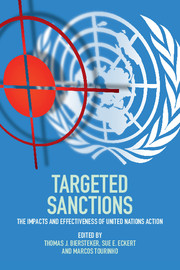Book contents
- Frontmatter
- Contents
- List of figures
- List of tables
- List of contributors
- List of abbreviations
- Introduction
- 1 Thinking about United Nations targeted sanctions
- 2 The purposes of targeted sanctions
- 3 Security Council dynamics and sanctions design
- 4 United Nations targeted sanctions and other policy tools: diplomacy, legal, use of force
- 5 The relationship between United Nations sanctions and regional sanctions regimes
- 6 Coordination of United Nations sanctions with other actors and instruments
- 7 Implementation of United Nations targeted sanctions
- 8 The impacts of United Nations targeted sanctions
- 9 The unintended consequences of United Nations targeted sanctions
- 10 The effectiveness of United Nations targeted sanctions
- 11 Institutional learning in targeting sanctions
- 12 Conclusion
- Appendix 1 List of cases and episodes
- Appendix 2 Sanctions effectiveness
- Appendix 3 TSC database codebook
- Appendix 4 Targeted Sanctions Consortium (TSC) participants
- Bibliography
- Index
10 - The effectiveness of United Nations targeted sanctions
Published online by Cambridge University Press: 05 March 2016
- Frontmatter
- Contents
- List of figures
- List of tables
- List of contributors
- List of abbreviations
- Introduction
- 1 Thinking about United Nations targeted sanctions
- 2 The purposes of targeted sanctions
- 3 Security Council dynamics and sanctions design
- 4 United Nations targeted sanctions and other policy tools: diplomacy, legal, use of force
- 5 The relationship between United Nations sanctions and regional sanctions regimes
- 6 Coordination of United Nations sanctions with other actors and instruments
- 7 Implementation of United Nations targeted sanctions
- 8 The impacts of United Nations targeted sanctions
- 9 The unintended consequences of United Nations targeted sanctions
- 10 The effectiveness of United Nations targeted sanctions
- 11 Institutional learning in targeting sanctions
- 12 Conclusion
- Appendix 1 List of cases and episodes
- Appendix 2 Sanctions effectiveness
- Appendix 3 TSC database codebook
- Appendix 4 Targeted Sanctions Consortium (TSC) participants
- Bibliography
- Index
Summary
The effectiveness of sanctions is probably the most frequently debated aspect of the policy instrument. This chapter begins with a review of the conventional wisdom about effectiveness (including the extensive scholarly literature on the subject), some general recommendations for how to think about evaluating effectiveness analytically, and a detailed explanation of how we have evaluated the effectiveness of UN targeted sanctions imposed since 1991. The chapter continues with a comparative empirical analysis of the research results, including detailed correlations of sanctions effectiveness and ineffectiveness with all relevant variables in our database (defined in Appendix 3), and concludes with some recommendations for future assessments of sanctions effectiveness.
Conventional wisdom among policy practitioners, journalists, and the general public holds that sanctions are typically imposed to force a change in the behaviour of targets, and that with a few notable exceptions, they do not ‘work’ particularly well as a policy instrument. When sanctions are contrasted with other policy instruments, especially the use of military force, few contend that sanctions are more ‘effective’ than military means. Sanctions are often perceived as a compromise measure between diplomacy and the use of military force (somewhere ‘between words and wars’), implying that decision-makers choose policy instruments from a continuum of escalating measures – from diplomacy to sanctions to military force – rather than use them in combination.
Most practitioners and journalists assess the effectiveness of sanctions regimes in broad, national terms, such as ‘the sanctions against Iran or Libya,’ rather than disaggregating the analysis into different phases of a conflict or dispute, as we have done in this book. When sanctions are applied, it is generally assumed that they function by placing pressure on a target or a broader population, by depriving them of some valued good or goods. Increasing the pressure through comprehensive, broader, or ‘crippling’ measures is presumed to increase the chances of people rising up and challenging their regime or divisions being induced within regime leadership. As suggested in Chapters 1 and 2, the general logic of how sanctions influence a target remain focused on how political outcomes (gain) can be produced by applying economic sanctions (pain), with the implicit assumption that more pain will yield greater gain.
Information
- Type
- Chapter
- Information
- Targeted SanctionsThe Impacts and Effectiveness of United Nations Action, pp. 220 - 247Publisher: Cambridge University PressPrint publication year: 2016
Accessibility standard: Unknown
- 8
- Cited by
